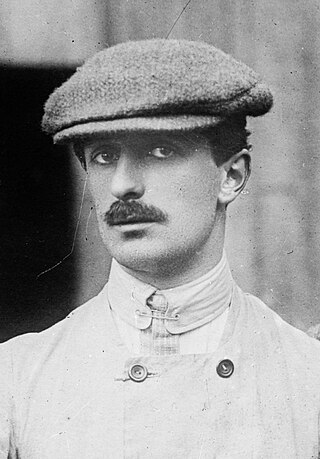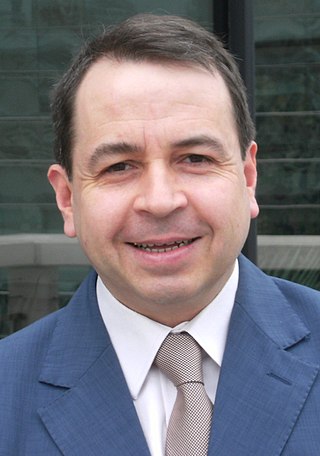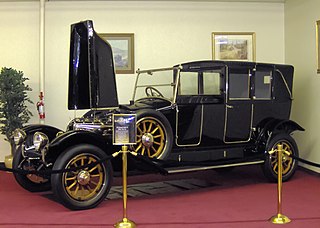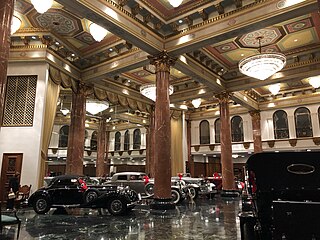
Citroën is a French automobile brand. The "Automobiles Citroën" manufacturing company was founded in 4 June 1919 by André Citroën. Citroën has been owned by Stellantis since 2021 and previously was part of the PSA Group after Peugeot acquired 89.95% share in 1976. Citroën's head office is located in the Stellantis Poissy Plant in Saint-Ouen-sur-Seine since 2021 and its offices studies and research in Vélizy-Villacoublay, Poissy (CEMR), Carrières-sous-Poissy and Sochaux-Montbéliard.

Gabriel Voisin was a French aviation pioneer and the creator of Europe's first manned, engine-powered, heavier-than-air aircraft capable of a sustained (1 km), circular, controlled flight, which was made by Henry Farman on 13 January 1908 near Paris, France. During World War I the company founded by Voisin became a major producer of military aircraft, notably the Voisin III. Subsequently, he switched to the design and production of luxury automobiles under the name Avions Voisin.

The Hispano-Suiza H6 is a luxury car that was produced by Hispano-Suiza, mostly in France. Introduced at the 1919 Paris Motor Show, the H6 was produced until 1933. Roughly 2,350 H6, H6B, and H6C cars were produced in total.

James Kenneth Lefebvre is an American former major league baseball player, coach, and manager. An infielder, he was signed by the Los Angeles Dodgers as an amateur free agent in 1962.

Top Gear is a British automobile magazine, owned by BBC Worldwide, and published under contract by Immediate Media Company. It is named after the BBC's Top Gear television show. It was first published in October 1993 and is published monthly at a price of £5.99. As of December 2022, there have been a total of 360 issues published in the UK. The major presenters of the rebooted television series — Jeremy Clarkson, Richard Hammond, and James May — were regular contributors, along with the series' production staff. "Tame racing driver" The Stig also regularly features in their car tests, though only communicates his thoughts and feelings through the articles of others. It is Britain's leading general interest car magazine in sales terms, with over 150,000 copies distributed each month in 2012, a drop of 50,000 from 2007. Previous columnists have included former Top Gear presenters Quentin Willson, Tiff Needell and Vicki Butler-Henderson.

Musée National de l’Automobile, Collection Schlumpf is an automobile museum located in Mulhouse, France, and built around the Schlumpf Collection of classic automobiles. It has the largest displayed collection of automobiles and contains the largest and most comprehensive collection of Bugatti motor vehicles in the world.

André Lefèbvre was a French automobile engineer.

Avions Voisin was a French luxury automobile brand established by Gabriel Voisin in 1919 which traded until 1939.

Aéroplanes Voisin was a French aircraft manufacturing company established in 1905 by Gabriel Voisin and his brother Charles, and was continued by Gabriel after Charles died in an automobile accident in 1912; the full official company name then became Société Anonyme des Aéroplanes G. Voisin. During World War I, it was a major producer of military aircraft, notably the Voisin III. After the war Gabriel Voisin abandoned the aviation industry, and set up a company to design and produce luxury automobiles, called Avions Voisin.

Jean-Pierre Thiollet is a French writer and journalist.

The 1923 Grand Prix season was part of a watershed year for motor racing that saw significant advances in motor-racing engineering, design and events. Fiat's chief designer, Guido Fornaca, developed the 805, the first supercharged car to win a Grand Prix. Benz appeared with the first mid-engined racer and, along with Bugatti and Voisin, produced some of the first efforts at aerodynamics on racing cars. With the United States also adopting the 2-litre formula, Harry Miller could use the smaller engine size to design the first single-seater race-car, ideally suited to American oval racing.

The 1923 French Grand Prix was a Grand Prix motor race held at Tours on 2 July 1923. The race was run over 35 laps of the 22.83 km circuit for a total distance of just under 800 km and was won by Henry Segrave driving a Sunbeam. This race is notable as the first Grand Épreuve to be won by either a British driver or a British car. The race also featured several innovative new technologies, including the first appearance of both supercharging and V12 engines in Grand Prix racing.

The Renault 40CV was a full-size luxury car produced by the French vehicle manufacturer Renault from 1911 to 1928.

The Mullin Automotive Museum was a privately owned automobile museum in Oxnard, California, US. Established in 2010, it displayed the personal car collection of businessman and philanthropist Peter W. Mullin. The museum had a large collection of vintage Bugattis, and many of the cars were fully restored and able to be driven. After founder’s death in September 2023, the museum closed on February 10, 2024.

Robert Wayne Cumberford is a former automotive designer for General Motors, author and design critic – widely known as Automotive Design Editor and outspoken columnist for Automobile magazine.

TheNethercutt Collection is a multi-storied museum and car collection complex located in Sylmar, California. It was founded by J.B. Nethercutt in 1971 and its centerpiece is the prestigious automobile collection of the Nethercutt-Richards family that contains over 250 cars, nearly all of which J.B. originally collected and owned. It is widely regarded as one of the greatest car museums in the world.§

Charles Yale Knight was an entrepreneur and inventor of the sleeve valve technology. His Knight engines would be used in the early cars, British tanks, and British aircraft. Customers included Henry Ford's competitor, John Willys and his company, Willys–Overland Motors, second largest car manufacturer after Ford Motor, as well as by Daimler, Mercedes, Peugeot and others. He was a millionaire by the time he was 44 years of age, in 1912.

The Hispano-Suiza H6B Dubonnet Xenia is a one-off luxury car made by Spanish automobile manufacturer Hispano-Suiza for French pilot and racing car driver André Dubonnet in 1938. The car was built on the chassis of the Hispano-Suiza H6B, however it uses the larger, more powerful engine from the H6C and an entirely new body design drawn by Jean Édouard Andreau and built by coachbuilder Saoutchik.

Citroën Argentina S.A. was the Argentine subsidiary of French automotive manufacturer Citroën which produced vehicles of the brand in the country. Established in 1959 and headquartered in Barracas, Buenos Aires, it operated in the country for 30 years producing vehicles until the economic crisis during the military government reorganisation process forced the company to cease its operations.

The Bucciali TAV 12 is the last model from the French car manufacturer Bucciali. Introduced in 1931, the TAV 12's history and characteristics are not fully understood. Unusual for the time, it had front-wheel drive and sensational bodywork, the flat and long limousine version of which was also known as la flèche d'or. The vehicle, of which only one is known, was dismantled into its individual parts before the outbreak of the Second World War. A collector had it rebuilt 40 years later. Since the early 1990s, the TAV 12 has been ready to drive again and is shown at exhibitions from time to time.




















